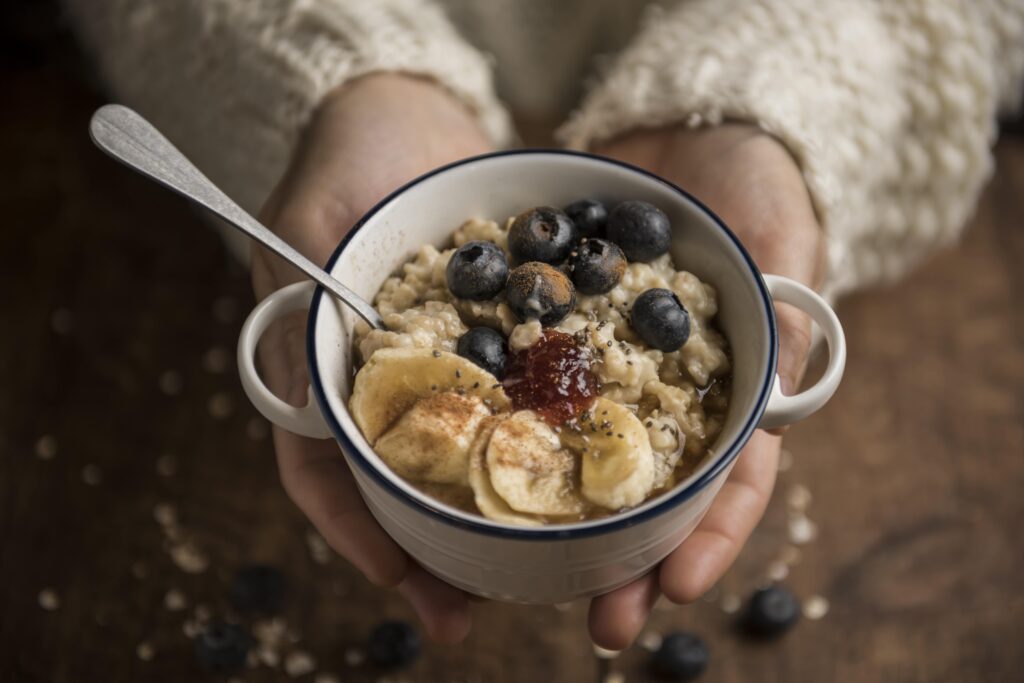We all know that a hot beverage on a cold day can warm us up a treat. A steaming bowl of soup and even a glass of the strong stuff have all been recommended for countless years in an effort to combat the cold, but are they really as effective as we have been led to believe?

The idea of food and drinks that can warm the body dates back to the ancient study of Traditional Chinese Medicine (known as TCM) and is still widely supported today.
TCM considers the energy properties of foods and considers that a balance of ‘cool’ and ‘hot’ foods, or ‘yin’ and ‘yang’ foods are essential to good health. Certain foods have a thermogenic effect. This simply means heat-producing. Thermogenesis happens when your body metabolises the food that you eat and produces heat as a by-product.
Broadly speaking, foods that take the body longer to digest can help raise your body temperature as a side effect and in turn, make you feel warmer. Although it’s tempting in the colder winter months to seek out comfort foods, these foods tend to be higher in sugar and unhealthy fats. Eating foods that are high in healthy fats, proteins and carbohydrates will fuel your body. Many of these foods are more complex and take longer to digest, keeping you feeling full for longer.
Harley Street Nutritionist, Clarissa Lenherr in this article by the Daily Mail, suggests eating foods that are high in fibre, protein and complex carbohydrates to encourage the body to convert calories into heat and generate warmth as a consequence.
So which foods are best for creating this thermogenic effect?
1. Porridge
A steaming bowl of delicious warm porridge is a well-known winter warmer, but its qualities go much further than it simply being a good, hot meal. Oats are a fantastic thermogenic food, filled with phytochemicals and high value nutrients that release energy slowly throughout the day, keeping your body warm.
2. Rice, Potatoes and Lentils – Wholegrains and Complex Carbs
Consuming whole grains and complex carbs, such as rice, potatoes and lentils can have thermogenic effects. The molecules in these types of foods take much longer to break down compared to other foods, thus encouraging your digestive system to work much harder. The result of this can be an increase in blood flow and therefore a rise in body heat. Why not have a go at making a potato and lentil curry – yum! Choosing brown or wholemeal rice will aid the thermogenic effect. The body will need to work harder to digest the food, causing your body heat to rise.
3. Meat, Fish, Eggs, Dairy, Legumes, Nuts and Seeds — Protein-Rich Foods
Protein rich foods have a high thermogenic effect and all of the foods listed above could help increase your metabolism for a few hours after consumption, thus raising your body heat. Adding nuts and seeds to a smoothie, boiled eggs sliced into a salad or having a delicious steak for dinner will all help warm you from the inside. Eating sardines is a great way to heat your body due to their high concentration of healthy fats and protein. These healthy fats are stored in your body’s reserves and broken down to generate energy which then warms the body.
4. Spices
Spices such as ginger, cinnamon, mustard, chilli, horseradish and turmeric all have a warming effect on the body, boosting your metabolism and providing warmth as a side-effect. Sprinkle cinnamon or ginger into your morning porridge, yogurt or cottage cheese or use turmeric and chilli in warming evening meals.
5. Tea and Coffee
Having a warm drink feels a sensible thing to do in the colder months but when you consider that the caffeine in tea and coffee causes a very slight rise in body temperature too, you really are helping your body to stay warm. Caffeine stimulates the release of fatty acids from the fat tissues in the body which can in turn raise body temperature.
So, if you are feeling chilly you now know which types of food will get your internal radiators going. A good mix of these thermogenic foods will help you to feel warmer and, where the body takes longer to break down and digest, will help to keep you feeling fuller for longer.
The contents of this article are for information purposes only and should not be relied upon in place of specialist dietary or nutritional advice. If you have food allergies or intolerances, it is always recommended to seek specific specialist advice.






